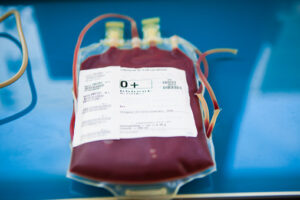Venovenous extracorporeal membrane oxygenation (ECMO) can be used to help provide respiratory support to patients with severe acute respiratory distress syndrome (ARDS). Since hemoglobin is essential for oxygen delivery, the general practice has been to maintain hemoglobin levels in the normal range during ECMO to maximize oxygen delivery. To date, however, there is very little evidence to guide transfusion thresholds for patients on ECMO. The main aim of the prospective, multicenter, observational PROTEMCO study was to determine the actual transfusion thresholds being used for adult patients undergoing venovenous ECMO. Between December 2018 and February 2021, 604 adult patients (71% men; mean age 50 years) with ARDS receiving venovenous ECMO were enrolled and followed daily for a maximum of 28 days in the ICU. The main causes of ARDS were COVID-19 (36%), viral pneumonia (19%), and bacterial pneumonia (17%). The mean hemoglobin at enrollment was 10.9 g/dL. During the study, 504 (83%) patients received at least one packed RBC transfusion with a mean pre-transfusion hemoglobin concentration of 8.1 g/dL. RBC transfusions were only associated with a lower risk of death when the hemoglobin concentration was less than 7 g/dL (hazard ratio. 0.15; 95% C.I., 0.03 to 0.74). A hemoglobin concentration transfusion threshold of 7 g/dL is consistent with the restrictive transfusion policies used for most critically ill patients. More research, however, is needed to confirm these findings.
Reference:

